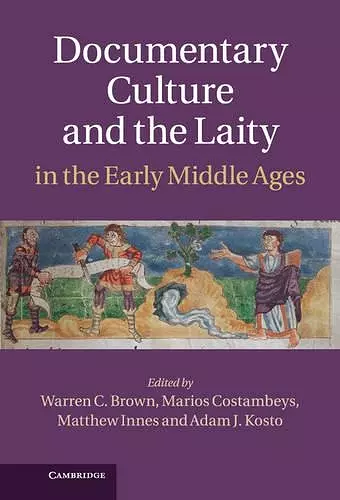Documentary Culture and the Laity in the Early Middle Ages
Warren Brown editor Matthew Innes editor Marios Costambeys editor Adam Kosto editor
Format:Hardback
Publisher:Cambridge University Press
Published:22nd Nov '12
Currently unavailable, and unfortunately no date known when it will be back

This revealing study explores how people at all social levels, whether laity or clergy, needed, used and kept documents.
Documents are the key building blocks of medieval social history. In this book, a series of tightly linked essays reveals for the first time the extent of their use and preservation by the laity in post-Roman Europe, North Africa and Egypt.Many more documents survive from the early Middle Ages than from the Roman Empire. Although ecclesiastical archives may account for the dramatic increase in the number of surviving documents, this new investigation reveals the scale and spread of documentary culture beyond the Church. The contributors explore the nature of the surviving documentation without preconceptions to show that we cannot infer changing documentary practices from patterns of survival. Throughout Late Antiquity and the early Middle Ages - from North Africa, Egypt, Italy, Francia and Spain to Anglo-Saxon England - people at all social levels, whether laity or clergy, landowners or tenants, farmers or royal functionaries, needed, used and kept documents. The story of documentary culture in the early medieval world emerges not as one of its capture by the Church, but rather of a response adopted by those who needed documents, as they reacted to a changing legal, social and institutional landscape.
'Most studies of early medieval literacy have emphasised the role of the Church in the production of written documents. This collection puts the spotlight on the involvement of the laity, and vividly reveals the extent to which laymen played an active role in documentary culture throughout the post-Roman World, from the Eastern Mediterranean to Anglo-Saxon England. In so doing it greatly enriches our understanding of government, administration and estate organisation in the centuries after Rome's fall.' Ian Wood, University of Leeds
'This is an extraordinarily important book for anyone seeking to understand the profound penetration of text culture into pre-modern societies. The authors raise fundamental questions about the meaning of archives, the reasons that documents were preserved, copied, or destroyed, and the relationship between changes in lay documentary practice and social and economic change, as well as between document preservation and political and ecclesiastical power. The cumulative result is a radical revision of facile, if long-popular, assumptions about orality, literacy, and textuality in Europe prior to the twelfth century.' Patrick J. Geary, Institute for Advanced Study
'If Mabillon was the Newton of diplomatics, this book is the Einstein, overturning old paradigms and forcing us to think anew about early medieval documents. Did we imagine that the Early Middle Ages was an 'oral culture'? That only public institutions had 'archives'? That monks and clerics alone were 'literate'? That 'the laity' started to appreciate writing only in the twelfth century? This book makes us realize how limiting those old terms have been. We can now say with considerable confidence that people at every level of early medieval society knew about, valued, used, and depended on the written word.' Barbara H. Rosenwein, Loyola University Chicago
'Taken as a group, these essays demonstrate important continuities and changes in lay documentary practice from late antiquity up through the high Middle Ages. There is new information and new ideas, including agendas for future work that need to be explored in order to develop a more sophisticated appreciation of early medieval documentary practice. The volume also offers solutions, indicating for example new ways in which the dichotomies of public-private and lay-clerical could be reinterpreted.' Marco Stoffella, Early Medieval Europe
ISBN: 9781107025295
Dimensions: 231mm x 152mm x 28mm
Weight: 720g
406 pages